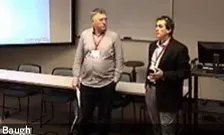
Dr Mark Hedges
Reader in Cultural Informatics
- Head of Department, Digital Humanities
Research interests
- Digital
Biography
Mark’s original academic background was in mathematics and philosophy, and he gained a PhD in mathematics at University College London, before starting a 17-year career in software and systems consultancy, working on large-scale development projects for industrial and commercial clients. After a brief career break – during which he gained an MA in late Antique and Byzantine Studies – he began his career at King’s in 2005 as Technical Manager of the Arts and Humanities Data Service, and then as Deputy Director and subsequently Director of the Centre for e-Research. He moved to his current position in the Department of Digital Humanities in 2012.
Research Interests and PhD Supervision
- Crowdsourcing and other participatory methods, both in the humanities and for social engagement.
- Digital and computational methods in the humanities
- Digital curation, digital archives, and research infrastructures
- Social and cultural impact of digital technologies and information, particularly in a development context
During the last ten tears, Mark has led a variety of interdisciplinary research projects in these and related areas, and is particularly interested in how digital technologies and digital information, are transforming both research, and society and culture more broadly. Most recently he has been working on initiatives relating to the impact of digital archives and information in Rwanda.
For more details, please see his full research profile.
Mark welcomes the opportunity to supervise PhD students who want to pursue projects that relate to these broad interests.
Teaching
Mark teaches on a variety of modules for the MA in Digital Asset and Media Management and the MA in Digital Curation.
Expertise and Public Engagement
Mark is engaged on impact activities relating to digital archives and technologies in the context of post-Genocide reconstruction in Rwanda. This has involved public engagement and press appearances in Rwanda.
Research

Computational Humanities Research Group
Computational Humanities research group

King's Cybersecurity Centre
An EPSRC-NCSC Academic Centre of Excellence in Cyber Security Research (ACE-CSR). It provides expertise on most areas of cyber security, it has a critical mass of researchers working on three main research themes and their interrelationship.
News
King's project awarded €2M UKRI funding to study the evolution of language
A new project led by Dr Barbara McGillivray will receive funding under the UKRI Horizon Europe guarantee.

King's College London and the Aegis Trust hold conference on digital archives in post-genocide Rwanda
The Department of Digital Humanities at King's College London and the Aegis Trust hold conference on digital archives in post-genocide Rwanda

Symposium on Computational Archive Science
Symposium on Computational Archival Science jointly organised by University of Maryland and King's College London

Innovating research in the humanities and cultural heritage sectors – PARTHENOS begins its work
The PARTHENOS project, which involves King's academics from the Department of Digital Humanities, has been awarded €12 million over four years by the EU

Research

Computational Humanities Research Group
Computational Humanities research group

King's Cybersecurity Centre
An EPSRC-NCSC Academic Centre of Excellence in Cyber Security Research (ACE-CSR). It provides expertise on most areas of cyber security, it has a critical mass of researchers working on three main research themes and their interrelationship.
News
King's project awarded €2M UKRI funding to study the evolution of language
A new project led by Dr Barbara McGillivray will receive funding under the UKRI Horizon Europe guarantee.

King's College London and the Aegis Trust hold conference on digital archives in post-genocide Rwanda
The Department of Digital Humanities at King's College London and the Aegis Trust hold conference on digital archives in post-genocide Rwanda

Symposium on Computational Archive Science
Symposium on Computational Archival Science jointly organised by University of Maryland and King's College London

Innovating research in the humanities and cultural heritage sectors – PARTHENOS begins its work
The PARTHENOS project, which involves King's academics from the Department of Digital Humanities, has been awarded €12 million over four years by the EU

